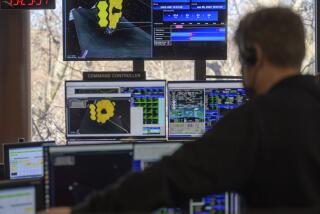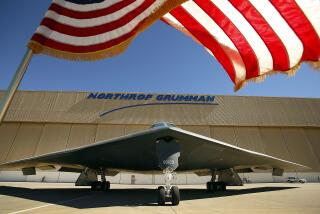Northropâs 1st Quarter Earnings Jump 73%
Northrop Grumman Corp. said Thursday that its first-quarter net income surged 73%, bolstered by sharply lower legal expenses and higher sales of military intelligence-gathering electronics and computer systems.
Earnings for the Century City-based defense contractor climbed to $409 million, or $1.11 a share, from $236 million, or 65 cents a share, in the year-earlier period. Revenue rose 4% to $7.5 billion from $7.2 billion.
The results beat Wall Streetâs expectations, which anticipated that the nationâs third-largest defense contractor would post net income of 92 cents a share. Shares of Northrop climbed 73 cents to $54.23 on the New York Stock Exchange.
The company also said operating profit rose at all six of its business units as the Pentagon continued to spend heavily on electronic equipment and computer systems that go on surveillance airplanes and satellites. Northropâs operating margins, or earnings before taxes, climbed 14% in the quarter to $638 million from $560 million.
âIâm extremely pleased with the operating performance across the company,â said Ronald D. Sugar, Northropâs chairman and chief executive. âWeâre off to a very good start.â He also said Northropâs earnings per share from continuing operations would rise at a double-digit rate in 2006.
Despite recent warnings of a slowdown in Pentagon spending, Northrop was the latest major defense contractor to report better-than-expected earnings. On Wednesday, Boeing Co., the nationâs second-largest defense firm, said military sales remained robust as it posted earnings that bested analystsâ estimates. Lockheed Martin Corp., the No. 1 Pentagon contractor, also beat Wall Street expectations this week.
âTheyâre coming in like gangbusters,â said Paul H. Nisbet, aerospace analyst for JSA Research Inc., who added that four years of robust spending for new weapons is âshowing on the bottom line of these companies.â
Northrop, with more than 27,000 workers in Southern California, makes and develops a wide range of equipment and systems for the federal government including anthrax detection devices for the Postal Service, nuclear aircraft carriers for the Navy and unmanned spy planes for the Air Force.
âSometimes we think of ourselves as a shipbuilder, as an airplane company, but if you stand back and you look at our revenues ... weâre driven by information technology, systems integration and electronics,â Sugar said. âWe have $10 to $11 billion in revenues that have nothing to do with platforms. Itâs mindware.â
Northropâs profit growth in the first quarter was fueled by sales of highly classified systems and equipment used by intelligence agencies for reconnaissance and surveillance.
The Pentagon is increasing spending for electronics, including those that go on Northropâs Global Hawk unmanned spy plane used in Iraq. These systems typically have higher profit margins than ships and planes, though Northrop rarely divulges the financial details.
In its latest quarter, Northrop said its Redondo Beach-based Intelligence, Surveillance and Reconnaissance division saw its operating profit jump 22% to $290 million.
Several one-time items also bolstered Northropâs bottom line, including a $45-million gain from the sale of a stake in TRW Automotive and lower legal expenses that slashed corporate spending by $90 million.
Northrop is sticking with its sales outlook of about $31 billion to $31.5 billion for 2005 but raised the guidance for net income by 10 cents to between $3.70 and $3.80 a share, mainly because of a delay until next year of an accounting change on expensing stock options.
Northrop also revised its revenue outlook for 2006 from $33 billion to $32 billion to $33 billion to reflect uncertainty over a multibillion-dollar destroyer contract. The Pentagon is considering restructuring Northropâs DDX destroyer program to have many of the subcontracts handled by the Navy. At the moment, Northrop is responsible for overseeing all aspects of the DDX development.
Looking forward, Sugar said Northrop was focused on winning several new business opportunities this year, including a project to build a replacement for the Space Shuttle, which could be potentially worth $100 billion. Northrop has teamed up with Boeing and will compete against a bid by Lockheed. NASA could announce the winner in September.
More to Read
Inside the business of entertainment
The Wide Shot brings you news, analysis and insights on everything from streaming wars to production â and what it all means for the future.
You may occasionally receive promotional content from the Los Angeles Times.










